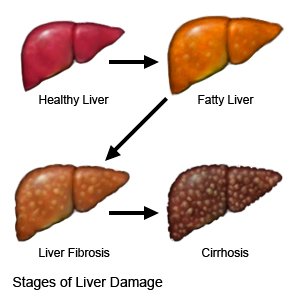Non-Alcoholic Fatty Liver Disease
Medically reviewed by Drugs.com. Last updated on Apr 6, 2025.
What is non-alcoholic fatty liver disease (NAFLD)?
NAFLD is a buildup of fat in your liver from a condition other than alcohol use. NAFLD usually does not cause symptoms. You may have pain in the upper right side of your abdomen or feel tired. NAFLD may also be called non-alcohol related fatty liver disease.
 |
What increases my risk for NAFLD?
- Health conditions such as obesity, high cholesterol, metabolic syndrome, type 2 diabetes, or hepatitis
- Certain medicines, such as chemotherapy, antibiotics, and heart medicines
- Exposure to chemicals that are toxic to the liver, such as pesticides, toluene, or vinyl chloride
- IV nutrition with total parenteral nutrition (TPN) for longer than 6 weeks
How is NAFLD diagnosed?
Your healthcare provider will ask about your medical conditions. Tell your provider about your past and current medicines. You may need any of the following:
- Blood tests will show how well your liver is working. The results may also be used to get information about your overall health and find the cause of your NAFLD.
- Ultrasound, CT scan, or MRI pictures may show if you have a liver injury or increased fat in your liver. You may be given contrast liquid to help healthcare providers see your liver better. Tell the healthcare provider if you have ever had an allergic reaction to contrast liquid. Do not enter the MRI room with anything metal. Metal can cause serious injury. Tell the healthcare provider if you have any metal in or on your body.
- A liver biopsy is a procedure to remove a small piece of your liver to be tested.
How is NAFLD treated?
Medicine is usually not used to treat NAFLD. Medicine may be used to treat other health conditions and manage blood sugar or cholesterol levels. Your medicine may be changed if it is causing your NAFLD.
How can I manage or prevent NAFLD?
- Ask about medicines and supplements. Some medicines and supplements can harm your liver. Acetaminophen is an example. Talk to your healthcare provider about all your medicines. Do not take any over-the-counter medicine or herbal supplements unless your provider says it is okay.
- Maintain a healthy weight. Ask your provider what a healthy weight is for you. Ask your provider to help you create a weight loss plan, if needed.
- Be physically active, as directed. Aerobic activity 3 times a week for 20 to 45 minutes can help decrease fat buildup in your liver. Examples are cycling, brisk walking, or jogging. Ask your provider about the best physical activity plan for you.

- Eat a variety of healthy foods. Healthy foods include vegetables, fruit, whole-grain breads, low-fat dairy products, beans, lean meats, and fish. Foods low in simple carbohydrates, low in high fructose corn syrup (HFCS), and low in trans fat may help decrease fat buildup in your liver.

- Do not drink alcohol. Alcohol may make NAFLD worse and harm your liver. Ask your provider for information if you need help to quit drinking.
When should I seek immediate care?
- You have shortness of breath.
- You have trouble thinking clearly or are confused.
- You feel lightheaded or faint.
- You have shaking, chills, and a fever.
When should I call my doctor?
- You have more pain or swelling in your abdomen.
- You feel more tired than usual.
- You bruise or bleed easily.
- Your skin or the whites of your eyes look yellow.
- You have questions or concerns about your condition or care.
Care Agreement
You have the right to help plan your care. Learn about your health condition and how it may be treated. Discuss treatment options with your healthcare providers to decide what care you want to receive. You always have the right to refuse treatment. The above information is an educational aid only. It is not intended as medical advice for individual conditions or treatments. Talk to your doctor, nurse or pharmacist before following any medical regimen to see if it is safe and effective for you.© Copyright Merative 2025 Information is for End User's use only and may not be sold, redistributed or otherwise used for commercial purposes.
Further information
Always consult your healthcare provider to ensure the information displayed on this page applies to your personal circumstances.
